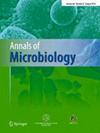埃塞俄比亚传统发酵食品和饮料中乳酸菌的益生菌潜力及安全性分析
IF 3
4区 生物学
Q2 BIOTECHNOLOGY & APPLIED MICROBIOLOGY
引用次数: 0
摘要
背景益生菌是一种活的微生物,可以有效地对抗食源性病原体,当摄入足够的量时,可以促进肠道健康。本研究评估了从埃塞俄比亚传统发酵食品和饮料(Kotcho、Bulla、Ergo、Cabbage-Shamita、Borde和Bukuri)中分离的乳酸菌的益生菌潜力和安全性。评估菌株在各种应激条件下的益生菌活性、耐受性和存活率,包括低pH、肠道抑制物质、盐浓度、胆盐和模拟胃液/肠液。此外,还测试了分离物对常见细菌和真菌病原体(金黄色葡萄球菌、鼠伤寒沙门氏菌、大肠杆菌、铜绿假单胞菌、肺炎克雷伯菌和白色念珠菌)的拮抗活性和安全性(自身聚集、共聚集、细胞源疏水性、溶血活性、dna酶和抗生素敏感性)。采用标准MALDI TOF/质谱法对最佳益生菌乳酸菌(LAB)进行了种级鉴定。结果共分离到125株潜在益生菌,其中17株(13.60%)在低pH(2、2.5和3)、胆盐(0.3%)、肠道抑制物质(苯酚、胆汁、低酸度、胃蛋白酶和胰腺)和模拟胃肠道环境下存活,存活率接近60-94%。此外,通过抗菌效果、防腐效果、细菌素产量、对低酸和胆盐的抗性以及模拟胃肠道条件下的生存潜力等附加筛选,进一步筛选出11株最佳的乳酸菌分离株。11株乳酸菌均对氨苄西林、万古霉素、庆大霉素、卡那霉素、克林霉素和氯霉素耐药,对链霉素和四环素敏感。高效益生菌LAB的MALDI TOF质谱分析结果将其归为Pediococcus、Enterococcus和Lactococcus,包括戊糖Pediococcus、屎肠球菌Enterococcus faecium、乳酸乳球菌Lactococcus lactoactis和酸碱Pediococcus acidilactii。结论埃塞俄比亚传统发酵食品和饮料是益生菌乳酸菌的良好来源。这些分离物可作为潜在的发酵剂和生物防腐剂,提高食品的保质期。本研究为乳酸菌的抗菌、发酵剂生产和保鲜等方面的开发和应用奠定了基础。本文章由计算机程序翻译,如有差异,请以英文原文为准。
Probiotic potential and safety analysis of lactic acid bacteria isolated from Ethiopian traditional fermented foods and beverages
Abstract Background Probiotics are live microorganisms that effectively combat foodborne pathogens, promoting intestinal health when consumed in sufficient amounts. This study evaluated the probiotic potential and safety of lactic acid bacteria isolated from selected Ethiopian traditional fermented foods and beverages (Kotcho, Bulla, Ergo, Cabbage-Shamita, Borde, and Bukuri). To assess the isolates’ probiotic activity, tolerance, and survival rate under various stressful conditions, including low pH, intestinal inhibitory substances, salt concentration, bile salt, and simulated gastric/intestinal juice. The isolates were also tested for antagonistic activities against common bacterial and fungal pathogens ( Staphylococcus aureus , Salmonella Typhimurium, Escherichia coli , Pseudomonas aeruginosa , Klebsiella pneumoniae , and Candida albicans ) and safety (auto-aggregation, co-aggregation, cell source hydrophobicity, hemolytic activity, DNase, and antibiotic susceptibility). The best probiotic lactic acid bacteria (LAB) were characterized to species level following standard MALDI TOF/mass spectrometry analysis. Results A total of 125 potentially probiotic LAB were isolated of which 17 (13.60%) isolates survived low pH (2, 2.5, and 3), bile salt (0.3%), intestinal inhibitory chemicals (phenol, bile, low acidity, pepsin, and pancreas), and simulated gastro-intestinal settings with near 60–94% survival rate. In addition, 11 best LAB isolates were further screened based on additional screening including their antimicrobial efficacy, preservative efficiency, bacteriocin production besides resistance to low acid and bile salts, and survival potential under simulated gastrointestinal conditions. All 11 LAB isolates were resistant to ampicillin, vancomycin, gentamicin, kanamycin, clindamycin, and chloramphenicol, while they were susceptible to streptomycin and tetracycline. The MALDI TOF mass spectrometry analysis result of efficient probiotic LAB grouped them under the genus Pediococcu s, Enterococcus , and Lactococcus including Pediococcus pentosaceus , Enterococcus faecium , Lactococcus lactis , and Pediococcus acidilactici . Conclusion Ethiopian traditional fermented foods and beverages are good sources of promising probiotic lactic acid bacteria. These isolates could serve as potential starter cultures and bio-preservative for the enhancement of the shelf life of foods. This study established the groundwork for the selection of excellent probiotics for the development and application of LAB for antibacterial action, starter culture production, and preservation activities.
求助全文
通过发布文献求助,成功后即可免费获取论文全文。
去求助
来源期刊

Annals of Microbiology
生物-生物工程与应用微生物
CiteScore
6.40
自引率
0.00%
发文量
41
审稿时长
3.2 months
期刊介绍:
Annals of Microbiology covers these fields of fundamental and applied microbiology:
general, environmental, food, agricultural, industrial, ecology, soil, water, air and biodeterioration.
The journal’s scope does not include medical microbiology or phytopathological microbiology.
Papers reporting work on bacteria, fungi, microalgae, and bacteriophages are welcome.
Annals of Microbiology publishes Review Articles, Original Articles, Short Communications, and Editorials.
Originally founded as Annali Di Microbiologia Ed Enzimologia in 1940, Annals of Microbiology is an official journal of the University of Milan.
 求助内容:
求助内容: 应助结果提醒方式:
应助结果提醒方式:


